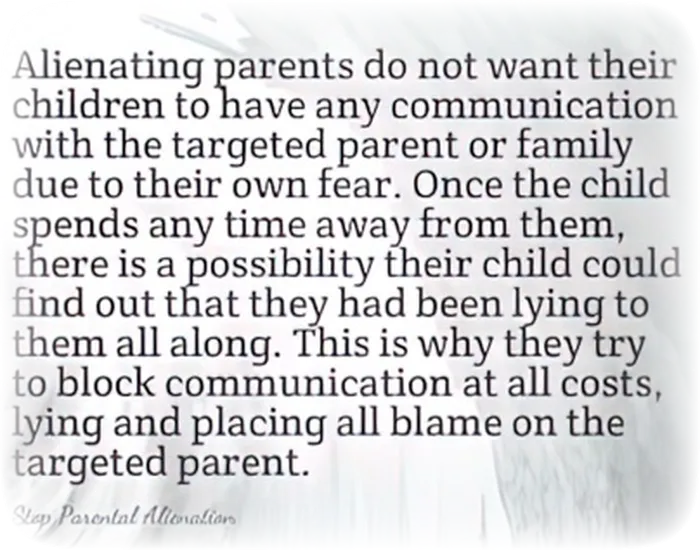Profiles of Abducting Parents
Alienating Parents

Typical Profiles of Abducting Parents
For those who still truly do not understand the consequences of Child Abduction and the “Parental Alienation Syndrome (PAS)” on children, please find some vital information and sources to familiarize yourself with on the topic.
Before presenting the distinguishing features of the risk profiles,
it is crucial to describe the features that most
of the profiles have in common:
# Abducting parents are likely to deny and dismiss the other parent’s value to the child. This tendency is more significant in abducting parents than in parents who chronically litigate custody. Abducting parents believe that they, more than anyone else, know what is best for their child; they cannot see how, or even why, they should share parenting with their ex-partner.
# Potential abducting parents are likely to abduct very young children (the mean age is 2–3). Such children are easier to transport and conceal, are unlikely to protest verbally, and may be unable to tell others their name or other identifying information. Older children who are taken or retained in violation of custody orders are usually those who are particularly vulnerable to influence or have colluded with the abducting parent.
# Most abducting parents (except those characterized as paranoid delusional) are likely to have the support of a social network—family, friends, cultural communities, and cult-like groups like the Russian Orthodox Church in my case. Or an underground dissident movement that provides not only practical assistance (money, food, lodging) but also emotional and moral support to validate the abducting parent’s extralegal actions.
Most custody violators do not consider their actions illegal or morally wrong, even after the involvement of the district attorney’s office.
Mothers and fathers are equally likely to abduct their children, although at different times. For example, for fathers, when there was no child custody order in place. For mothers, after the court had issued a formal custody decree.
Profile 1:
When There Has Been a Prior Threat of or Actual Abduction
– When a parent has made credible threats to abduct a child or has a history of hiding the child, withholding visitation, or snatching the child from the other parent.
Profile 2:
When a Parent Is Paranoid Delusional
– One parent demonstrates flagrantly paranoid, irrational beliefs and behaviors or psychotic delusions about the other parent.
– Consequently, they often use their children blatantly as instruments of revenge or punishment or as trophies in their fight with the ex-partner
Profile 3:
When a Parent Is Severely Sociopath
– The relationships between a sociopath and others are selfish, exploitable, and intensely manipulative. They are likely to hold exaggerated beliefs about their superiority and entitlement. They are highly gratified by their ability to exert power and control over others.
– As with paranoid and delusional parents, sociopaths’ parents cannot perceive their children to have different needs or rights.
Profile 4:
When Parents Who Are Citizens of Another Country End a Mixed-Culture Relation or Marriage
– Parents who are citizens of another country (or have dual citizenship) and who have a strong relationship with the extended family in their home country have long been recognized as potential kidnappers.
– The risk of Abduction is especially acute at the time of separation. These parents may feel cast adrift from their mixed-culture relationship. As a result, they may need to return to their ethnic or religious roots to find emotional support and reconstitute a shaken self-identity. That may be a way of insisting that the abducting parent’s cultural identity be given preeminent status in the child’s upbringing.
– In this profile, parents at risk of becoming abductors are those who idealize their own family, homeland, religion, and culture and deprecate any other culture. They are likely to repudiate the child’s mixed heritage.
Profile 5:
When Parents Feel Alienated from the Legal System and Have Family-Social Support in Another Community
- Several subgroups of potential parental abductors feel alienated from the judicial system.
Subgroup 1.
– Parents who are destitute and poorly educated, who are unaware of custody and abduction laws, and who do not have the means to seek legal representation or psychological advice to help them resolve their differences appropriately. A significant part of the abducting parents belongs to this subgroup.
Subgroup 2.
– Parents who belong to specific ethnic, religious, or cultural groups may hold views about child rearing that are contrary to prevailing custody laws, emphasizing gender neutrality and the rights of both parents.
Subgroup 3.
– A mother who has a transient, unmarried relationship with her child’s father views the child as her exclusive property, and her extended family supports this belief.
Subgroup 4.
-Parents who are victims of domestic violence are at risk of abducting their children, especially when the courts and community have failed to take the necessary steps to protect them from abuse or hold the abuser accountable.

Nicolaos AA Cheropoulos
Father of Anthie’ and Alexandra
Stockholm, April 2020
Reviewed Oct. 2023

“Parental Alienation Syndrome (PAS)”
1. Basic definition
Parental Alienation happens when one parent manipulates a child to dismiss the other parent in an irrational and unjustified manner, usually in the context of divorce or separation.
Common behaviours of the alienating parent:
Badmouthing
Distortion campaign
Deny visitation
Erase the targeted parent
Psychological manipulation
Fear tactics
From my personal experience, I have repeatedly faced 5 of these 6 points since my children were abducted in 2017.
– I have been denied visitations in attempts to erase my existence (although it does not work on my beloved daughter Anthie’ yet).
– Their mother’s fear tactics and refusal to let them maintain their language skills. As a result, my daughter Anthie’ fear’s talking and avoids going into discussion with me the few times we have been allowed to meet.
Still, her instinct of self-preservation is well developed, which gives me some hope!
– Liudmila Trafimovich feels actually happy that my children cannot communicate with me anymore because they have lost their language. In addition, Ms. Trafimovich refuses to let my children attend private classes in the Greek and Swedish languages, with all the expenses covered by me. Although, I have beenproposing and requesting this from a very early stage of the performed Abduction.
– This tragedy is unfortunately performed with the acceptance and indifference of all the judges-prosecutors and public authorities in Belarus who have the nerve to talk about “In the Best Interest of The Children”, which is ridiculous.
2. Why Courts Fail to Recognize Parental Alienation
– Dr. Steve Miller, M.A., M.D., is a professor at Harvard Medical School and has extensive experience with Parental Alienation cases. He shares his insights with Dr. Amy J.L. Baker, Ph. D., as to why most court-appointed “experts” fail to recognize the dynamic of Parental Alienation.
Video:
Dr. Steve Miller, M.A., M.D.
Why Courts Fail to Recognize Parental Alienation
Video:
Dr. Amy J.L. Baker Ph. D.
Amy Baker Talking about PAS
3. Why Alienating Parents Alienate
Most alienating parents have borderline/narcissistic personality disorder features that probably come from their traumatic childhood (I can confirm this for Ms. Trafimovich).
– As a result, alienating parents regard people with whom they are close as “love objects” that belong to them and them alone. They are generally emotionally insecure about relationships, and overwhelming fears of rejection and abandonment drive them”.

The Difference Between Estrangement & Parental Alienation
Source:
# Talk about Parental Alienation
# Tactics of a Narcissistic Mother
“Dr. Childress likens the Parental Alienation dynamic to a puppet show where the audience invariably addresses the puppet without even noticing the puppet-master who is pulling the strings.
Even well-educated mental health professionals, lawyers, friends, and family take the child’s claims at face value. As a result, they remain ignorant of the psychological harm that actually happens”.
4. False Allegations of Abuse
One of the most heinous techniques alienating mothers and fathers use against the “targeted” parent is false allegations of child abuse.
Such accusations present a challenging dilemma for any judge. Making a mistake in either direction can have severe consequences. Of course, physical or sexual abuse can damage a child for life, but on the other hand, false allegations can deprive a child of a loving parent. In addition, they can leave the child with lifelong feelings of guilt.
5. Definition of Parental Alienation
“Parental Alienation is defined as the deliberate attempt by one parent to distance their children from the other parent. Parental alienation results from a parent actively working at causing hard feelings between a child and the other parent”.
6. The behavior of an Alienated Parent
A parent who has been alienated from their child will continue to pursue a relationship with the child. The parent will attempt to communicate regularly, sending emails and cards. Thus, remember that even though you may be cut off completely, don’t give up and try to find a way around it, like creating a blog or a Website, because, thanks to technology, your children will find out sooner or later and they will know that you never gave up on them!
The same parent will use the court system to fight the alienating parent and retain their legal rights to a relationship with their child. Hopefully, you will litigate in a country that respects the Law and The Hague Convention regarding Child Abduction.
No battle is too big and no expense too great for an alienated Left-Behind parent who has brutally been separated from their children!
Video:
Dr. Steve Miller, M.A., M.D.
Parental Alienation – Evidence Based Science
Obviously, in Belarus, fathers are treated as second-class citizens (and, if they are foreigners, even worse; they are then treated like third-class citizens). They are only considered Sperm Donors and Alimony Payers by some “Judges” and “Mediators”.
These ruthless, unscrupulous primitives use children as a tool to blackmail the left-behind parent into accepting their insane conditions, of course, with the argument “In the Best Interest of The Child!”! After which, they publish yet another story of their “success” on their website as self-promotion to show the audience: “Look how good we are; we just deceived another left-behind parent from another country! “So miserable and pathetic”!

